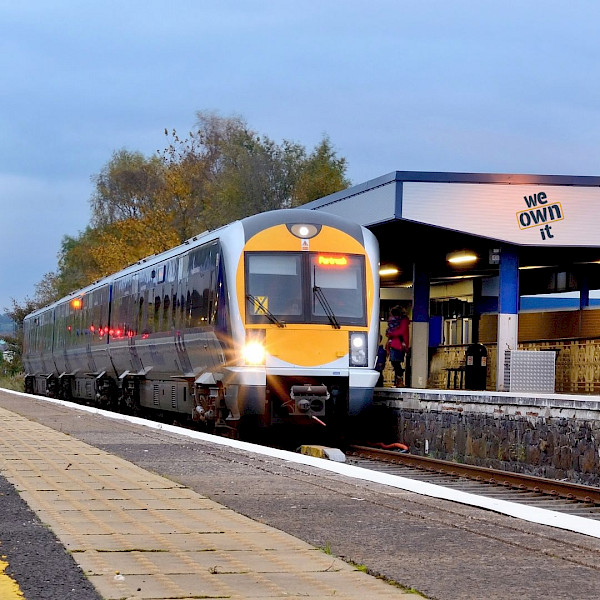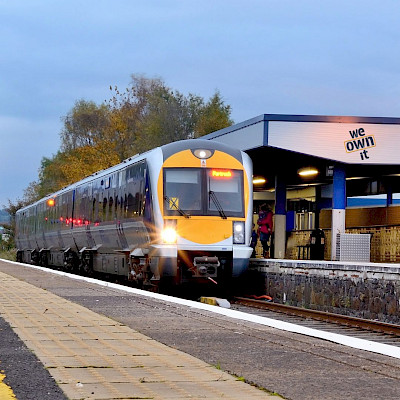
2 Sep 2025
More rail and bus fare increases are on the way – and they threaten to undo much of the good promised by wider public ownership and regulation of rail and bus networks.
Plans for rail re-nationalisation and bus re-regulation raise the tantalising prospect of transport provided as a public service, as a universal right. But that could be snatched away again by the government’s obsession with charging high, often extortionate, fares.
It does not have to be like this. Public transport finance could and should be radically overhauled to release it from dependence on fares. We in Fare Free London advocate a system that is not only publicly owned, and generously funded, but also free at the point of use.
Fare-free public transport works. It is spreading like wildfire internationally, to more than 130 municipalities in Brazil, dozens across Europe and many elsewhere.
Since Fare Free London started, early last year, we have been urging the Mayor of London to appoint a commission to look at how the city could implement a zero-fares policy.
But a UK-wide approach, and a change in government policy, are sorely needed – and we are working with Fare Free Yorkshire, Get Glasgow Moving, Tipping Point, the Greener Jobs Alliance and trade union organisations, to push this on to the national political agenda.
Fare increases are out of control
UK rail fares rose 5.1% this year – compared to a 3.2% increase in the Retail Prices Index – and, if the government sticks to the formula it has been using, the fares it regulates will rise by 5.8% next year.
“Rising rail fares are putting people off using the railways and making rail travel unaffordable”, Campaign for Better Transport chief executive Ben Plowden warned last month.
The welcome decision by state-owned ScotRail to scrap higher prices for peak-hour tickets shows that things could go in the opposite direction.
But nationally, the unsustainable increases, that force passengers off trains, continue the trend set since rail privatisation in the mid 1990s. Over that time, rail fares are up by at least one-fifth in real terms, and some fares have more than quadrupled.
Meanwhile train operators have so degraded the service that the government has started taking them back into public ownership – after they have creamed off hundreds of millions of pounds, some of it going to tax havens. Rolling stock companies continue to rake in not millions but billions, while the state-owned Network Rail, via artificially low track access charges, subsidises all these profiteers.
Nationalisation provides an opportunity to make trains affordable, and move away from a car-centred transport system, campaigners say – but that will not happen automatically.
In fact the UK’s premier publicly-owned transport network, the London underground, already has fares that are among the highest in the world – and the government has decreed that they must rise by more than the inflation rate for the next five years.
Transport secretary Heidi Alexander has told London mayor Sadiq Khan that overall Transport for London fares must rise by 1% above the Retail Prices Index, in a funding deal that lasts until 2030.
Londoners who are “already feeling the pinch of the cost of living crisis and some of the most expensive public transport in Europe” will be “dismayed” at the terms of the settlement, Michael Roberts of London Travelwatch said. It will mean a 5.8% hike in fares next year, not only for trains and the underground, which are already eye-wateringly expensive, but potentially on buses, too, where London fares are capped at £1.75 for a single journey.
It is difficult to compare travel networks in different countries, but in 2023 researchers at Imperial College found that the average tube fare in London was 35 US cents per kilometre – more than double the 15 cents average across a range of global cities.
The research, commissioned by the Community of Metros (Comet), also found that the London Overground was the fourth most expensive suburban rail system in the world, and London bus fares the third highest in the world.
The problem is that TfL, although publicly owned, is stuck with an outdated funding model that has grown out of the decades-long neoliberal onslaught on public services. It relies on fares for roughly 70% of its income – in contrast to other global cities where that figure is well under half.
Paris funds public transport from a payroll tax; Hong Kong makes extensive use of land value capture; and New York uses a patchwork of taxes – which could be upgraded if Democrat Zohran Mamdani, who has pledged zero-fare bus travel, is elected mayor in November.
Zero-fares transport works
Over the last decade, free public transport has become a reality in dozens of cities across the world – and it works. Usage goes up and the poorest in society benefit, in a variety of contexts. Free transport is popular, and fears that it would discourage city authorities from investing in networks have not been borne out, Wojciech Kȩbłowski, a leading researcher of this topic, has found.
In Europe, public transport is now free in the whole of Luxembourg and Malta; the capitals of Estonia (Tallinn) and Serbia (Belgrade); and a string of cities in Poland, France (including Montpellier and Dunkerque) and Italy (including Genoa). Kansas City and Albuquerque are the largest cities in the USA to introduce it.
But the world’s biggest wave of zero-fares policies is in Brazil, where they now apply in more than 130 municipalities, 16 of which have more than 100,000 population. Since 2022 that number has almost doubled, from 73.
Crisis provided the impetus. In the decade to 2023, Brazil’s public transport networks lost 30% of their passengers due to a combination of economic pressures, escalating fares and motorisation.
Free public transport is the only means local governments found to reverse the trend, Daniel Santini, an urban mobility researcher at the University of São Paulo, said. “Cities that have tried to recover [bus] passengers with other strategies have not achieved significant results.”
But now the zero-fares approach is established, it is spreading. Once a totem for the Workers Party and the left, other local authorities now adopt it for pragmatic reasons, Santini points out.
In India, the provision of free public transport to women has been implemented with hugely successful results in Karnataka, Punjab, Delhi and elsewhere.
How to build support
As the UK tiptoes back to a measure of public ownership, we will campaign for fare-free systems, and push back against the neoliberal dogma that services are best provided by the market and must be paid for in full at the point of use.
Railways are being taken into public ownership only as and when the privateers’ contracts run out, but ticketing retail looks set to remain market-based, Ellie Harrison of Bring Back British Rail warns. “If the railways are publicly owned, decisions can be made to rationalise and reduce fares, and to align the system with other objectives such as getting cars off the road and reducing carbon emissions.
“That’s what other countries such as Germany and Austria do, and that’s what we hope the UK government will do.”
As for buses, the Bus Services Bill will curb the worst aspects of privatisation, by giving local authorities the right to control and coordinate services with franchising, and to set up their own bus companies. But it will leave a long way to go.
Not only should local authorities save millions by bringing services in-house, but they should also completely rethink the way they are funded, using payroll taxes, land value capture and other methods to push fares down, Transport for Quality of Life argues.
Fare Free London calls on the mayor, Sadiq Khan, to make good on his commitment to set up a publicly-owned bus company – but also to set up a commission to examine the potential for a fare-free system.
The government could facilitate cheap or free fares countrywide if it chose to, instead of ploughing billions into reinforcing the car-centred road system, e.g. on the ruinous Lower Thames Crossing project.
If Westminster does not rethink neoliberal funding models, then the welfare state’s enemies will not only anathematise free travel, but also try to roll back existing benefits. Already, the Institute of Economic Affairs is lobbying journalists with baseless scare stories about the “costs” of free travel for the over-60s in London.
In the neoliberal dystopia, public services would be replaced by paid-for services, like health care provision in the US. The alternative is to map out zero-fare systems: these would in the first place benefit people on low incomes – who are “limited in their ability to access the building blocks of a good life” by poor transport provision, according to a scathing report by the Institute for Public Policy Research.
The social damage done by extortionate fares is widely recognised. The Transport Committee of the House of Commons has just recommended that free travel for under-22s, introduced in Scotland in 2022, should also be adopted in England, where limited services and high fares are “a mjor barrier to employment” that is “restricting opportunity rather than enabling it”.
Fare Free London, Fare Free Yorkshire, Get Glasgow Moving and others asked: why only under-22s? Why only buses? Free public transport opens up cities, towns, and potentially all areas, to all those who live there. It liberates. It restores the idea of public services for people, not profit.
Fare Free London was set up in February 2024, with the support of the Stop the Silvertown Tunnel coalition, Greener Jobs Alliance, Tipping Point and local campaign groups. We have won the support of the Industrial Workers of Great Britain, Doctors in Unite and other trade union organisations.
On Saturday 27 September, 10.0am-1.0pm, all are welcome to our event on “How to build support for free public transport”, including a panel discussion with Caroline Russell (City Hall Greens), Ruth London (Fuel Poverty Action), and trade union and other activists. Daniel Santini, our keynote speaker (on zoom), will update us on free public transport in Brazil, and we will hold our first annual meeting.
Simon Pirani is a member of the organising group of Fare Free London

